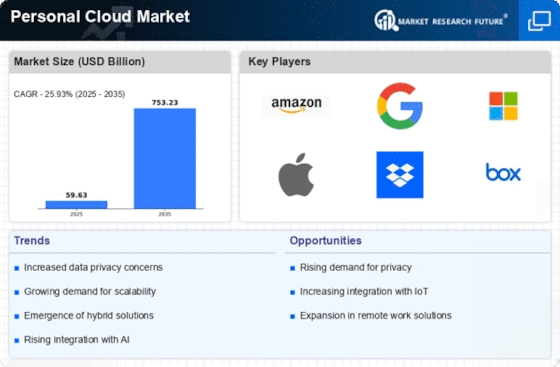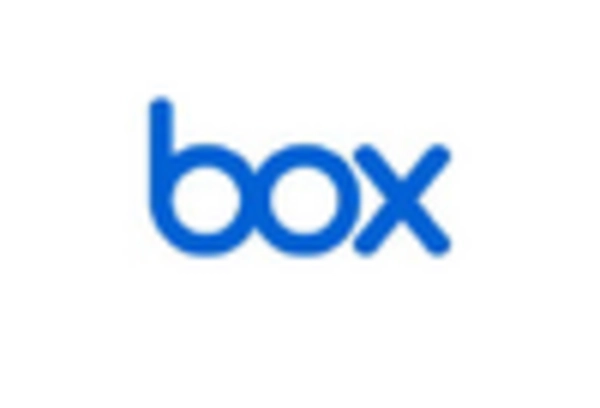Market Analysis
Personal Cloud Market (Global, 2023)
Introduction
The Personal Cloud Market has emerged as a vital segment of the overall technology market, driven by the rising demand for secure, accessible, and user-friendly data storage solutions. As a result of the growing need for the digital management of individuals and small businesses, the popularity of personal cloud services has increased. The market is characterized by a broad range of offerings, from established players that provide robust platforms to nimble start-ups that are introducing niche solutions that meet specific user requirements. The combination of trends, such as the growing use of mobile devices and the growing concern about data security and privacy, has also accelerated the demand for personal cloud solutions. The landscape is evolving rapidly as consumers become more aware of the benefits of cloud technology. This is presenting both challenges and opportunities for companies that want to take advantage of the opportunities offered by this market.
PESTLE Analysis
- Political
- In 2023, the political environment in the personal cloud market is largely influenced by data protection legislation. For example, the European Union’s General Data Protection Regulation (GDPR) imposes strict guidelines on the use of personal data, which affects 450 million European citizens. According to the report, companies will have to invest about € 1 billion annually in data protection measures. These costs could have an impact on the operational costs and the entry strategies of new players.
- Economic
- The economic conditions for the personal cloud are shaped by the increasing demand for digital storage solutions. By 2023, it is expected that cloud storage will be an annual expense of around tens of dollars per consumer, in the course of the growing digitalization of everyday life. Also, the post-pandemic recovery of the world economy has led to a 3% increase in disposable income, which consumers can use for personal cloud services, thus driving the market.
- Social
- There is an increasing awareness of data privacy and security among consumers. In early 2023, a survey revealed that 68% of users are concerned about the safety of their personal data in the cloud. The result is a growing preference for cloud services that emphasize their high security standards. A quarter of the population is now working remotely, which is a significant change in the way people use cloud services.
- Technological
- Technological progress is rapidly changing the personal cloud market. Artificial intelligence has entered the field of cloud computing, which has increased the efficiency of data management, and the AI-based solutions have reduced the time it takes to find and access data by as much as 40 percent. Furthermore, 5G is expected to increase the performance of cloud services, with a 60 percent coverage of the global population by the end of the year. This will lead to faster and more reliable access to personal cloud services.
- Legal
- Legal factors are increasingly important in the personal cloud market, especially in terms of intellectual property rights and data protection. In 2023 the United States enacted the Cloud Act, which allows government access to data in the cloud. Approximately seventy percent of cloud service companies in the country are affected. The companies must implement strict compliance procedures, which cost them an average of $200,000 per year per company.
- Environmental
- In the personal cloud market, considerations of the environment and the issue of sustainable development are becoming more and more important. In 2023, it is estimated that data centres will account for 2% of the world's total carbon emissions. As a result, many cloud service companies are investing in renewable energy. In the cloud services industry, more and more companies are committing to sustainable development. By 2025, 40 percent of the large cloud service companies aim to be carbon neutral. This may require them to invest more than $ 10 billion.
Porter's Five Forces
- Threat of New Entrants
- The barriers to entry in the personal cloud market are moderate, mainly due to the need for significant investment in technology and the physical environment. However, although there are established players with strong brand names, new entrants can compete by taking advantage of technological development and lower costs. It will be difficult to compete with established competitors.
- Bargaining Power of Suppliers
- Suppliers’ bargaining power in the personal cloud market is relatively low. It is characterized by a wide variety of technology suppliers and service offerings, which makes it easy for companies to change suppliers. Also, many cloud services are based on standard technology, which reduces suppliers’ power.
- Bargaining Power of Buyers
- The buyers in the personal cloud market have high bargaining power because of the large number of alternatives available to them. It is easy to compare services and to switch between them, which increases competition among the companies. This competition forces the companies to keep their customers by offering better prices and more features.
- Threat of Substitutes
- The threat of substitutes in the personal cloud market is moderate. External hard drives and USB sticks are alternatives, but the cloud is more convenient and more accessible. However, the technology of local storage is developing and this could become a threat to the cloud.
- Competitive Rivalry
- Competition in the personal cloud market is intense, with numerous players vying for market share. A number of big players dominate this market, including Amazon, Google, and Microsoft. These players are constantly improving their products and their pricing strategies.
SWOT Analysis
Strengths
- Increased demand for data privacy and security among consumers.
- Ability to access and share files from anywhere, enhancing user convenience.
- Growing integration with smart home devices and IoT applications.
Weaknesses
- High initial setup costs for consumers and businesses.
- Complexity in managing and maintaining personal cloud systems.
- Potential for data loss or breaches if not properly secured.
Opportunities
- Expansion of cloud services tailored for remote work and collaboration.
- Rising trend of digital content creation driving storage needs.
- Partnerships with tech companies to enhance service offerings and reach.
Threats
- Intense competition from established cloud service providers.
- Rapid technological changes requiring constant innovation.
- Regulatory challenges regarding data protection and privacy laws.
Summary
The Personal Cloud Market will be characterized by strong demand, driven by the increasing concerns for privacy and the ease of access to information from remote locations. High set-up costs and management complexity may limit the market’s growth. Opportunities include the increasing need for remote access to information and digital content creation. Threats include competition and government regulations. Companies must be able to exploit their strengths and overcome their weaknesses to take advantage of the emerging opportunities in this changing market.


















Leave a Comment